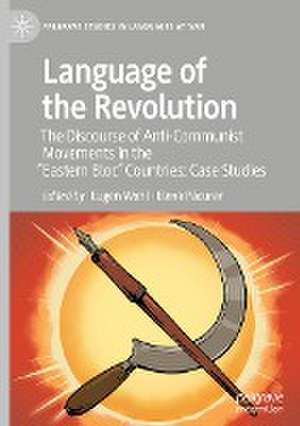Language of the Revolution: The Discourse of Anti-Communist Movements in the “Eastern Bloc” Countries: Case Studies: Palgrave Studies in Languages at War
Editat de Eugen Wohl, Elena Păcuraren Limba Engleză Hardback – 18 noi 2023
Din seria Palgrave Studies in Languages at War
- 15%
 Preț: 644.18 lei
Preț: 644.18 lei - 15%
 Preț: 643.34 lei
Preț: 643.34 lei -
 Preț: 389.70 lei
Preț: 389.70 lei -
 Preț: 385.62 lei
Preț: 385.62 lei - 15%
 Preț: 645.79 lei
Preț: 645.79 lei - 15%
 Preț: 588.04 lei
Preț: 588.04 lei -
 Preț: 336.14 lei
Preț: 336.14 lei -
 Preț: 386.99 lei
Preț: 386.99 lei - 15%
 Preț: 641.71 lei
Preț: 641.71 lei -
 Preț: 388.90 lei
Preț: 388.90 lei - 15%
 Preț: 587.53 lei
Preț: 587.53 lei - 18%
 Preț: 728.28 lei
Preț: 728.28 lei - 15%
 Preț: 636.45 lei
Preț: 636.45 lei - 18%
 Preț: 887.55 lei
Preț: 887.55 lei - 18%
 Preț: 945.62 lei
Preț: 945.62 lei - 18%
 Preț: 727.48 lei
Preț: 727.48 lei - 18%
 Preț: 727.00 lei
Preț: 727.00 lei
Preț: 953.03 lei
Preț vechi: 1162.23 lei
-18% Nou
Puncte Express: 1430
Preț estimativ în valută:
182.36€ • 190.40$ • 150.93£
182.36€ • 190.40$ • 150.93£
Carte tipărită la comandă
Livrare economică 04-18 aprilie
Preluare comenzi: 021 569.72.76
Specificații
ISBN-13: 9783031371776
ISBN-10: 3031371771
Pagini: 413
Ilustrații: XVII, 413 p. 9 illus.
Dimensiuni: 148 x 210 mm
Greutate: 0.66 kg
Ediția:1st ed. 2023
Editura: Springer International Publishing
Colecția Palgrave Macmillan
Seria Palgrave Studies in Languages at War
Locul publicării:Cham, Switzerland
ISBN-10: 3031371771
Pagini: 413
Ilustrații: XVII, 413 p. 9 illus.
Dimensiuni: 148 x 210 mm
Greutate: 0.66 kg
Ediția:1st ed. 2023
Editura: Springer International Publishing
Colecția Palgrave Macmillan
Seria Palgrave Studies in Languages at War
Locul publicării:Cham, Switzerland
Cuprins
Introduction.- Narratives of discord: misinformation, dissimulation, truth.- Voices from Below. Propaganda and Petitioning Power in Late Socialist Romania (Mioara Anton).- The Great Discursive Divide in Communist Romania (Veronica Manole).- “Words that Must Not Be Named”: Narratives of Language, Power, and Identity in Communist Romania (Réka Lugossy).- Compromise or Survival. Adapting the Religious Discourse and the Topics Covered in Publications of the Romanian Orthodox Church during the Communist Regime (Călin Emilian Cira).- The Founding Texts of a Revolution. Romania 1989 (Kazimierz Jurczak).- Words at war: expressive forms of resistance, dissidence and protest.- The Language of Inner Freedom for Dissent: Müller and Liiceanu before and after the Revolution (Jonathan Lahey Dronsfield).- The Rhetoric of Albanian Insurgency: Communism and Anti- Communism in Kosovo (Henrique Schneider).- The Change of Worlds and Words. The Language of Protest during and after the Romanian Revolution in 1989 (Dina Vîlcu).- Written, spoken, performed: archiving the memory of (post-)communism.- Humility and Hatred, Forgiveness and Hope. A Linguistic Approach on the Subjective Literary Experiences in the Romanian Communist Society (Maria-Zoica Eugenia Balaban).- Retrieving Memory via Desk-Drawer Literature: from Reality Escapism in Stories about Cadmav to Contemporary Reflective Writing in With My Woman’s Mind (Ioana Mudure-Iacob).- Surviving the Change, Adjusting the Language. Romanian Writers in the Cultural Media, December 1989-1990 (Magdalena Răduță, Oana Fotache).- The December 1989 Revolution in Post-Communist Romanian Drama (Anca Hațiegan).- Staging Communism in Romania: Language, Propaganda, Memory in Caryl Churchill’s Mad Forest and Matei Vișniec’s How to Explain the History of Communism to Mental Patients (Alina Cojocaru).- The Language of the Velvet Revolution versus the Anti-Language of Post- Communist Crime. A Sociolinguistic Analysis of Contemporary Czech Crime Historical Television Series (Luboš Ptáček).- Surprising Silence? Possible Reasons for Scarcity of Representation of the Velvet Revolution in Czech Film Adaptations in the 1990s (Radoslav Horák).- Comparing the Portrayal of the Fall of the Berlin Wall in Two Spanish Newspapers: A Multimodal Analysis (Samira Allani, Silvia Molina-Plaza).- Borghesia and Laibach against the Socialist Regime of Yugoslavia: Insights from a Socio-Linguistic Analysis (Mitja Stefancic).- Conclusions.
Notă biografică
Eugen Wohl is Lecturer within the Department of Foreign Languages for Specific Purposes, Faculty of Letters, Babeș-Bolyai University of Cluj, Romania and a theatre critic (IATC member).
Elena Păcurar is Lecturer within the Department of Foreign Languages for Specific Purposes, Faculty of Letters, Babeș-Bolyai University of Cluj, Romania, where she teaches practical courses of English for Specific Purposes.
Textul de pe ultima copertă
This edited book fills a void in the existing research concerning anti-communist movements in Central and Eastern Europe, outlining the linguistic implications of the cultural, social and political metamorphoses brought about by the (change of) regime. The authors included in this volume approach the topic from a variety of perspectives, but, ultimately, focus on language seen as a fundamental tool for simultaneously subjugating and liberating, concealing and revealing truth, discouraging dissidence and fostering revolt. Readers are invited to discover the linguistic implications of the many shapes and forms that the 1989 anti-communist revolutions took. Equally interesting are the investigations of the revolution aftermath, in the first years of transition to democracy. Perceived as a whole throughout the Cold War (1947-1991), the so-called "Eastern Bloc" managed to reveal its heterogeneity, the singularity of each of its comprising states and the multitude of itsinternal contrasts, most vividly perhaps, in the manifold manifestations of the 1989 anti-communist fight. This book will be of interest to academics and researchers from various fields, including history, (socio)linguistics, political studies, and conflict studies.
Eugen Wohl is Lecturer within the Department of Foreign Languages for Specific Purposes, Faculty of Letters, Babeș-Bolyai University of Cluj, Romania and a theatre critic (IATC member).
Elena Păcurar is Lecturer within the Department of Foreign Languages for Specific Purposes, Faculty of Letters, Babeș-Bolyai University of Cluj, Romania, where she teaches practical courses of English for Specific Purposes.Caracteristici
Voices the socio-political experience of the nations included in the “Eastern Bloc” Offers insightful revisitations of the Central and Eastern European revolutions Explores the underlying mechanisms and strategies of ideological manipulation
